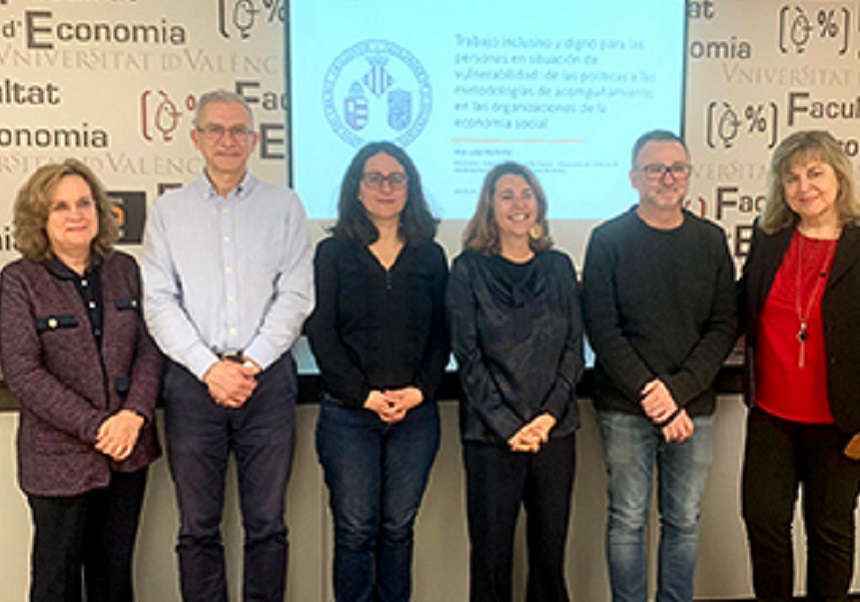
On 20 February, Ana Luisa Martinho, a student of the Doctoral Programme in Social Economy at IUDESCOOP-Universitat de València, read and defended her doctoral thesis. The thesis is entitled "Inclusive and dignified work for people in vulnerable situations: from policies to methodologies of accompaniment in social economy organisations". Her thesis supervisors were Gemma Isabel Fajardo García, Professor of Commercial Law at the University of Valencia (UV), and Deolinda Aparicio Meira, Professor of Law at the Polytechnic of Porto-Portugal.
On 20 February, the reading and defence of the doctoral thesis of Ana Luisa Martinho, a student of the Doctoral Programme in Social Economy at IUDESCOOP-University of Valencia, took place. The thesis is entitled "Inclusive and dignified work for people in vulnerable situations: from policies to support methodologies in social economy organisations". The thesis supervisors were Gemma Isabel Fajardo García, Professor of Commercial Law at the University of Valencia (UV), and Deolinda Aparicio Meira, Professor of Law at the Polytechnic University of Porto-Portugal. The examining board was formed by Fernando Marhuenda Fluixá, Professor of Didactics and School Organisation at the UV (chair); Marisa Roriz Ferreira, Professor of Marketing for non-profit at the Polytechnic of Porto (secretary), and Aitor Bengoetxea Alkorta, Professor of Labour and Social Security Law at the University of the Basque Country/ Euskal Herriko Unibertsitatea. The thesis obtained the highest mark.
As the author explains, this research analyses, in a context of fair and inclusive transition, the field of socio-occupational integration of people in vulnerable situations, based on the policies that shape it and the monitoring methodologies in social economy organisations (OES).
Although the right to work is legally enshrined as a universal right, for a wide range of groups classified as vulnerable, disadvantaged or disadvantaged, this right is not guaranteed. This research focuses on SEOs "both because of their appropriateness in terms of the purpose and principles guiding their functioning and because of their tradition and importance in terms of intervention in the field of inclusive work". In fact, according to the thesis, these organisations play a central but not very visible role in this field. In Portugal, due to the absence of specific and articulated policies and the incipient scientific production and dissemination on the subject, the field can be considered unstructured and this study aims to contribute to its delimitation.
Therefore, and given the exploratory nature of this research, the author has followed a qualitative methodological approach. The research design is based on nine Portuguese case studies and is complemented by the documentary analysis of seventeen Portuguese policies in support of OES and the consideration of five Spanish experiences as inspiration for the analysis of the Portuguese reality.
The results point to the existence of a de facto empirical field, i.e. the practices of organisations that accompany vulnerable people to integrate into the labour market, using legal forms that were not specifically designed for this purpose. Diversity and innovation were verified in the responses of the people accompanied by the professionals - called insertion agents - for whom this study traces a functional profile.
The results made it possible to formulate a set of lines of action aimed at the following actors that make up the field under study in Portugal: i) second-level OES; ii) policy makers and legislators; iii) teaching-learning institutions; and finally, iv) professionals who accompany people in vulnerable situations.





